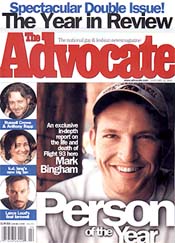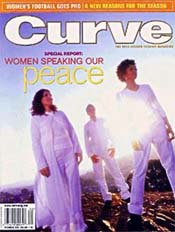 |

|
|
|
| By Rodger Streitmatter Media Matters
My major criticism was that the gay glossies were far more interested in talking about how to whiten your teeth and find the perfect napkin ring than about prodding their readers to demand that the government find a cure for AIDS and enact a federal law protecting gay people from being fired from their jobs. I still have those same concerns today. But, at the same time, I have been heartened by some of the health-oriented articles the magazines have been slipping into their editorial mix. Take this month's issue of OUT, for example.
Hallelujah! Far too many gay men are obsessed with attaining the perfect physique a few years ago, Olympic diver Greg Louganis even said that he was insecure about his body! So I heartily applaud this article that encourages guys to look inside instead.
The latest issue of Instinct contains an informative piece for those of us who sometimes have a tough time getting a good night's sleep. "One tip that not many of us know," the article reads, "is that you shouldn't drink to try to fall asleep." Author Malinda Trimble goes on to explain that alcohol may help a person fall asleep initially. But if that same person wakes up in the middle of the night, the alcohol in his system will make it harder for him to get back to sleep again. For those of us who know what it's like to down a margarita or two, fall asleep, but then see the alarm clock flashing "3:15!" later in the night, this is helpful advice. During my little survey of trendy gay magazines, I also found several pieces of real news, the kinds of items that the mainstream press rarely showcases.
And Instinct told its readers a couple months ago that having sex on a regular basis - that's three times a week, in case you're wondering - improves a person's cholesterol level. It tips the HDL/LDL (good/bad) cholesterol balance toward the good side. My little jaunt through recent issues of the gay glossies also reaped some examples of the magazines being responsible by including some words of warning, vis-ą-vis health matters, in some of their longer features. An Instinct piece about the future of condoms reminded readers that, even if an HIV vaccine were developed, people would still need to be concerned about the plethora of other sexually transmitted diseases. And another lengthy Instinct feature about the popularity of plastic surgery among gay men - it's happening, even if many of us frown at the idea - told readers that this may not be an area where they should shop around for the lowest possible price. The article quoted a doctor as saying, "If you go to Target, buy a shirt and wear it once and don't like it, well, you throw it away. That's fine. But if you go and get discount plastic surgery and the person does a bad job, you're stuck with it." The slick lesbian magazines also contain good advice regarding matters of sex and good health.
The magazine's advice columnist began, in the vernacular that is her way: "When it comes to sex or the decision to refrain, sweet pea, you don' t have to do a cotton pickin' thing you don't want to." The writer continued with a lengthy and reassuring response that ended: " As for STDs, careful and consistent attention to safer-sex procedures can go a long way to keep those pesky fellows at bay. So stick to those fabulous guns of yours, and look inward for direction on the sex/no sex debate as time progresses." Advice for healthy living gets no better than that.  Rodger Streitmatter, Ph.D. is a member of the School of Communication faculty
at American University in Washington, D.C. His latest book, Voices of Revolution:
The Dissident Press in America has just been published by Columbia University Press.
He is also the author of Unspeakable: The Rise of the Gay & Lesbian Press in America
(Faber & Faber, 1995) and Raising Her Voice: African American Women Journalists
Who Changed History (The University Press of Kentucky, 1994)
Rodger Streitmatter, Ph.D. is a member of the School of Communication faculty
at American University in Washington, D.C. His latest book, Voices of Revolution:
The Dissident Press in America has just been published by Columbia University Press.
He is also the author of Unspeakable: The Rise of the Gay & Lesbian Press in America
(Faber & Faber, 1995) and Raising Her Voice: African American Women Journalists
Who Changed History (The University Press of Kentucky, 1994)
|

© 1997-2002 BEI
 In 1995 when I wrote my book Unspeakable: The Rise of the Gay and Lesbian
Press in America , I was less than complimentary about the bumper crop of
slick, upscale magazines that began to proliferate in the 1990s.
In 1995 when I wrote my book Unspeakable: The Rise of the Gay and Lesbian
Press in America , I was less than complimentary about the bumper crop of
slick, upscale magazines that began to proliferate in the 1990s.
 The Advocate recently ran a short piece about the first online pharmacy
that focuses only on HIV, which is called BodyPlus and can be accessed
through TheBody.com online AIDS information service.
The Advocate recently ran a short piece about the first online pharmacy
that focuses only on HIV, which is called BodyPlus and can be accessed
through TheBody.com online AIDS information service.
 A recent issue of Curve ran a letter from a gay 15-year-old who was scared
and confused about STDS.
A recent issue of Curve ran a letter from a gay 15-year-old who was scared
and confused about STDS.